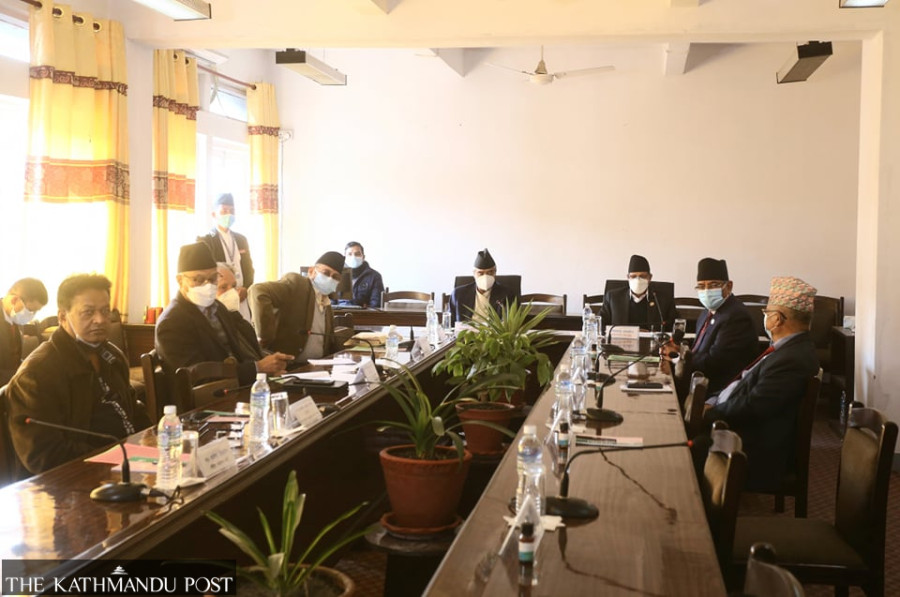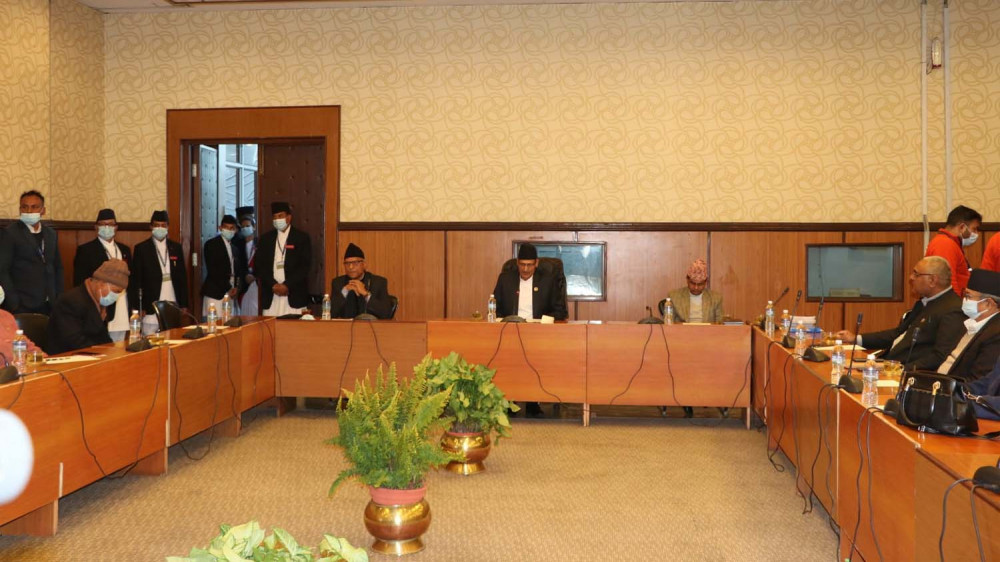National
Coalition on the brink of breakdown as Maoist Centre plays spoilsport
Ruling parties are meeting today to try to find an elusive consensus as Maoist Centre and CPN (Unified Socialist) are unlikely to change their positions on the US grant.
Anil Giri & Binod Ghimire
Prime Minister and Nepali Congress President Sher Bahadur Deuba said on Tuesday that he had spoken to Speaker Agni Prasad Sapkota regarding the tabling of the Millennium Challenge Corporation (MCC)-Nepal Compact Parliament on Wednesday. Lawmakers attending Tuesday’s Parliamentary Party meeting said they were confident about moving the $500 million American grant in the House.
But on Wednesday, Deuba had to make a volte-face after his key coalition partner—Communist Party of Nepal (Maoist Centre)—played a spoilsport. A meeting of the Parliamentary Party of the Maoist Centre on Wednesday morning took a tougher stance. It decided to quit the government if the compact was tabled in Parliament.
The Maoist Centre chair communicated his Parliamentary Party’s decision to Deuba. The plan to move the MCC compact was stalled.
The meeting of the Business Advisory Committee, which was discussing the day’s agenda for the House meeting, was called off abruptly.
“The MCC compact will not be tabled today. The meeting between the prime minister and Maoist chair reached an agreement to this effect. The meeting of the ruling alliance called for Thursday will take a decision on the matter,” Pushpa Bhusal, the Nepali Congress whip and a member of the Business Advisory Committee, told the Post after the meeting between Deuba and Dahal.
A member from Dahal’s Secretariat said that the prime minister and the Maoist chair reached an understanding not to table the compact in the House and decided to call a meeting of top leaders of the ruling party at 3pm on Thursday.
The change of mind by Deuba, however, has raised a couple of key questions. Why did he make a public statement that he had already spoken with the Speaker about tabling the compact? And will the coalition remain intact if the partners fail to find consensus at Thursday’s meeting?
The Maoist Centre, along with another coalition partner CPN (Unified Socialist) led by Madhav Nepal, has been against the MCC compact’s parliamentary ratification. Both the commuinist forces are of the view that the US grant agreement cannot be ratified without amendments to some of its provisions, even though Washington has categorically denied any revision at this time.

“We have decided to wait until Friday to build consensus within the ruling alliance,” said Dilendra Badu, minister for law after Wednesday’s House meeting. “The MCC compact will be tabled on Friday.”
Though Badu said attempts will be made for consensus in the next two days, leaders from the Congress say chances are slim.
A Congress Central Working Committee member said the party was committed to tabling the compact but the Maoist Centre threw the spanner in the works.
“I don’t see the possibility of any agreement in the next two days,” the Congress member told the Post. “Thursday's meeting could decide the future of the ruling alliance. I don’t think it can continue anymore.”
But if there is no agreement among the coalition partners on Thursday, the House meeting is unlikely on Friday. Leaders say the coalition could also fall apart.
“The prime minister told us that the MCC compact will be tabled on Friday,” said a minister who did not wish to be named.
According to him, the prime minister decided to wait for one more day.
How the Maoist Centre’s viewpoint on tabling the compact will change in one day was not clear though.
According to Congress sources, Deuba agreed to stall the plan to table the compact on Wednesday after Dahal requested one meeting among the leaders of the ruling coalition.
Maoist leader Narayan Kaji Shrestha said that since no discussion had been held within the ruling coalition about tabling the compact, Dahal urged Deuba to call a meeting of the alliance partners.
Since the Maoist Centre and the CPN (Unified Socialist) are unlikely to change their positions on the US grant, Thursday’s meeting could decide the fate of the coalition.
Another Congress leader said that Thursday’s meeting could be the last meeting of the ruling alliance if it failed to reach any consensus on the MCC compact.
“If two ruling parties continue with their positions on the compact, then we do not have any option other than to break the alliance,” said the leader.
According to the leader, Deuba during Wednesday’s meeting told Dahal that the country’s credibility is at stake because of the MCC compact.
“We could be isolated. If we reject the MCC compact, we could face serious financial and economic consequences,” the leader quoted Deuba as telling Dahal. “So you [Dahal] should convince your leaders and cadres.”
Deuba came under increasing pressure to move the US grant in Parliament after continuous pressure from Washington, which over the last few days has communicated multiple times that they were not going to wait beyond February 28, a deadline set by Deuba and Dahal themselves through a letter sent to the MCC chairman on September 29 last year.

In the letter, Deuba and Dahal had sought four-five months for building consensus for the compact’s ratification. Dahal, meanwhile, denied sending any such letter; he continued to maintain a tough stance on MCC compact—even his political document presented at the party’s general convention spoke strongly against a ratification.
Hours after the government decided not to table the compact, US ambassador Randy Berry met with Prime Minister Deuba, according to Deuba’s Secretariat.
“The ambassador enquired about the government position and how it plans to move ahead to ratify the compact within the February 28 deadline,” a member from the Secretariat said.
When the government prepared to table the compact, there was a general understanding among many Congress leaders that Dahal would publicly oppose it but allow Deuba to table it. However, Dahal appears to have failed to face pressure from his own party members and cadres.
Shrestha of the Maoist Centre said that Thursday’s meeting would be crucial.
“Our position not to allow the tabling of the MCC compact remains intact,” Shrestha, who was seen on the Kathmandu streets protesting the US agreement, told the Post.
In yet another display of its duplicity, the Maoist Centre, despite being part of the current government, had directed its student and youth wing to stage protests in front of the Parliament meeting.
Political commentators say the Maoist Centre blocking the government move despite being part of it demonstrates unethical politics of its leaders.
“Nepali politics has reached its nadir, and the Maoist Centre has made a huge contribution in this process,” Shreekrishna Aniruddh Gautam, a political commentator, told the Post. “Deuba too has given room to question his commitments by failing to stand by his decision to table the MCC compact at Wednesday’s meeting.”
Deuba appears to have come under the influence of Dahal in deciding to put the compact on hold, as he found his party would be cornered if the coalition partners decided to stand against the US grant collectively.
According to Maoist leaders, Dahal at the Parliamentary Party meeting said that not only the Maoist Centre and the CPN (Unified Socialist), a section of the Janata Samajbadi Party led by Upendra Yadav and Rastriya Janamorcha Nepal were also against tabling the MCC compact in Parliament.
If those opposing the MCC compact, which is meant for building electricity transmission lines and improving roads in Nepal, decide to quit the government, the eight-month-old alliance will break apart, leaving the Nepali Congress alone.
“Our position is clear. We will not remain in the alliance if the government tries to push the compact for ratification without amendments and consensus among the parties,” Giriraj Mani Pokhrel, a Central Committee member of the Maoist Centre, told the Post. “The ruling alliance’s meeting on Thursday will decide the future course.”
Prakash Sharan Mahat, spokesperson for the Congress, said that the prime minister decided to oblige to the request by the Maoist chair as the former is still trying to get all forces on board.
“As the prime minister of the country, it is Deuba’s duty to make maximum efforts to build broader consensus on a crucial issue like the MCC, as it is not only related to funds but also to Nepal’s credibility,” Mahat told the Post. “That the prime minister decided not to table it on Wednesday despite saying so a day before does not mean he has backtracked. He is very much for its tabling and its ratification. He is working in the best interest of the country and Nepal’s image. It’s not about our party or our government.”




 9.7°C Kathmandu
9.7°C Kathmandu















